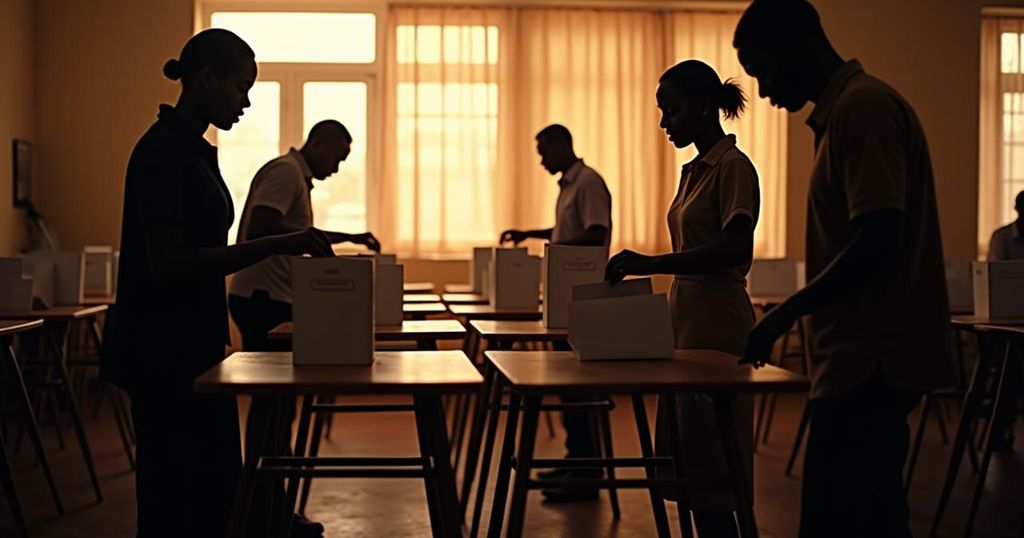Mozambique’s Elections: A Test for Democracy as Frelimo Faces Challenges After 49 Years in Power
Mozambique is set to vote for a new president on Wednesday, with the ruling Frelimo party potentially extending its 49-year control. Daniel Chapo, the Frelimo candidate, seeks to succeed President Filipe Nyusi, while independent candidate Venancio Mondlane poses a significant challenge. The elections will also decide parliamentary representation and provincial governors amid concerns of electoral credibility and ongoing insurgency in the north.
On Wednesday, Mozambique will hold elections to select a new president, marking a significant moment that could allow the ruling Front for the Liberation of Mozambique (Frelimo) to maintain its grip on power for nearly half a century since gaining independence from Portugal in 1975. The Frelimo candidate, Daniel Chapo, age 47, is vying to succeed President Filipe Nyusi, who has reached his term limit. Chapo, a law professor and former radio broadcaster, emerged as the ruling party’s candidate following an internal selection process in May. Although analysts predict that Chapo will face a formidable challenge from 50-year-old independent candidate Venancio Mondlane, his party—previously associated with the opposition movement—has seen its influence dwindle over time. In addition to voting for the presidency, voters will also decide on parliamentary compositions and provincial governors in a country facing numerous social and political challenges, including an ongoing jihadist insurgency in the northern region of Cabo Delgado. Both Chapo and Mondlane have pledged to address this crisis, which has resulted in approximately 1.3 million people being displaced due to violence. As the election approaches, concerns surrounding the credibility of the electoral process loom large due to Frelimo’s previous election-related controversies, including accusations of ballot tampering and result falsification. In the last local elections, Frelimo was controversially declared victorious in 64 out of 65 municipalities. Despite these claims, the party continues to deny any wrongdoing. International observers from organizations such as the European Union are present to monitor the elections closely. Frelimo’s historical dominance in Mozambican politics was established after independence, and it has frequently faced opposition from the Mozambique National Resistance (Renamo), especially during the civil war that lasted from 1977 until a peace agreement in 1992.
The context of the upcoming elections in Mozambique is deeply rooted in the nation’s socio-political landscape. Frelimo’s longstanding dominance has shaped the political fabric of the country since its independence, having ruled unchallenged in many respects for nearly fifty years. The internal turbulence caused by a prolonged civil war with Renamo, once a major opposition party, indicates the fragile nature of peace and stability in Mozambique. More recently, the emergence of a violent insurgency in the northern province of Cabo Delgado has exacerbated social grievances, such as poverty and widespread unemployment, posing significant challenges for any outgoing or incoming administration. The elections are pivotal as they represent a crucial juncture for Mozambique’s democratic development, governance accountability, and socio-economic recovery.
In conclusion, the elections set to take place in Mozambique signify not only a potential continuity of Frelimo’s prolonged rule but also reflect the ongoing challenges the country faces in terms of governance, human security, and socio-economic recovery. The presence of independent candidates such as Venancio Mondlane highlights the growing discontent among the populace regarding socio-economic conditions, particularly among the youth. As the electoral process unfolds, the scrutiny surrounding the legitimacy of votes will likely influence future political dynamics in Mozambique. Given the historical context and ongoing socio-political struggles, the results of these elections will have a profound impact on Mozambique’s path forward, particularly in terms of addressing the pressing issues of stability and development.
Original Source: apnews.com




Post Comment